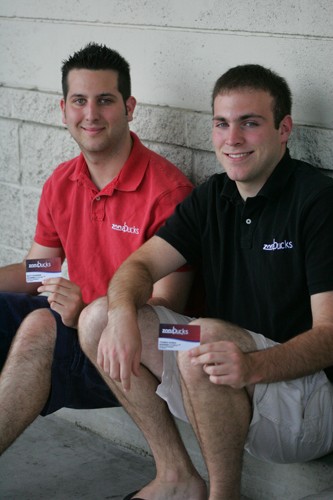A new meal plan, created by two UA students, allows students to use a card to make purchases off campus.
Pre-business sophomore Adam Richman and public administration senior Thomas Rosen, who met as members of Alpha Epsilon Pi fraternity, started the program, currently called ZonaBucks.
The ZonaBucks card is accepted at more than 30 businesses off campus, including restaurants, grocery stores and drugstores, and can be used to purchase everything from toiletries to alcohol. An online system tracks individual spending, but there is no way to see itemized receipts from purchases. The program currently has about 1,000 users.
Richman said the idea came about in March after the pair heard friends complaining about the limited meal options they had on campus.
“”There’s all these places on University (Boulevard) students couldn’t go because their money was trapped on their CatCard,”” he said. “”They needed a flexible way to go out in Tucson to local restaurants rather than being confined on campus.””
The students had contemplated starting other businesses, such as a restaurant near campus, before they came up with the idea of ZonaBucks.
“”We were sitting in the car bouncing ideas off of each other and said there’s a real need for this,”” Richman said. “”Finally the right light bulb went off.””
It cost them more than $50,000 to start the company, which came from credit cards and family.
Richman and Rosen said the biggest advantage to their plan, as compared to the CatCard, is being able to use it off campus and having no restrictions on purchases.
“”Another huge advantage is there’s no cost to receive funds off our card,”” Richman said. “”The school meal plan charges fees and percentages if you want to take money off your CatCard. We don’t charge to take money out and it rolls over into the next school year completely free. The CatCard has fees to roll (the money) over.””
There is a $5 activation fee for their card and an additional $1 fee each month the card is used. In addition, Richman and Rosen make a percentage of each transaction. Richman said they hope to start seeing a profit by the end of the semester.
The off-campus restaurant Cereal Boxx was one of ZonaBucks’ first merchants to sign up.
“”My wife and I tried to put the program together ourselves a year and a half ago,”” said Jordan Schacht, owner of the Cereal Boxx. “”We tried to work with the university to work with merchants locally. We couldn’t get the university to work with us. They wanted to keep it (the CatCard) on campus.””
Schacht said they let the idea go because it was costly and they were coming out with new product launches for their restaurant.
“”When they (Richman and Rosen) contacted us directly, we were very excited,”” Schacht said. “”We had laid the groundwork so we gave them our blueprint, our contacts and our networking.””
The Cereal Boxx has already seen a definite increase in clients since the program began two weeks ago, but Schacht couldn’t give an exact number.
Some students are enjoying the flexibility the new card offers.
“”I live off campus now and I have to do my own shopping, so it’s nice to be able to go grocery shopping and use it,”” said sophomore pre-business major Jake Signet. “”Obviously I want the most variety. The more choices I have the better.””
Signet discovered the company after receiving a flyer on University Boulevard around the end of August.
“”I went to their Web site, looking at their restaurant list, and started going places the first couple days back to school and saw ‘ZonaBucks accepted here,'”” Signet said. “”I signed up with $100 just to test it out and I think I blew through that in less than a week. Since then, I basically told my parents to load it up for me.””
Although Richman and Rosen say their meal plan doesn’t compete with the CatCard because they offer things the university doesn’t, the burgeoning company ran into legal trouble in August.
“”We received a letter from the marketing department from Arizona Athletics saying there was a chance we were in violation by using the word ‘Zona’,”” Rosen said.
The university tried to bring the pair to court to file a temporary restraining order on the company, which would have stopped their sales completely during move-in week, when they signed 60 percent of their current clientele, Rosen said.
Although an attorney told them they had a strong case, they didn’t think it was worth risking their business to keep the name, since they would have had to temporarily put ZonaBucks on hold, Rosen said.
“”We received the letter the Monday before classes began,”” Rosen said. “”That was right in the beginning of move-in week, when our marketing needed to be in full force.””
James Francis, associate athletics director and an official in the Trademarks and Licensing Department, wouldn’t comment on this specific issue. But he did say that generally “”registered trademarks of the university may not be used without permission from the university.””
Instead of going to court, the students chose to change the name to CampusBucks within 90 days of receiving the restraining order.
“”At first I thought the change would hurt,”” Richman said. “”We did a good job marketing ZonaBucks and created a logo in a short amount of time and it was instilled in people’s heads. But all it did was actually expedite something we were planning to do.””
Richman and Rosen say they hope to take the company national so that students can use their CampusBucks card around different universities throughout the nation.









